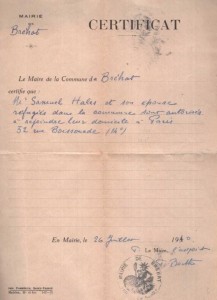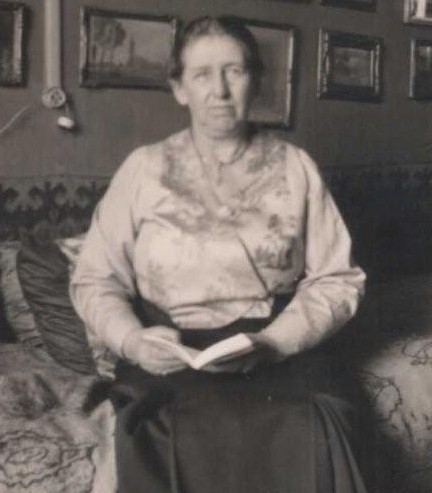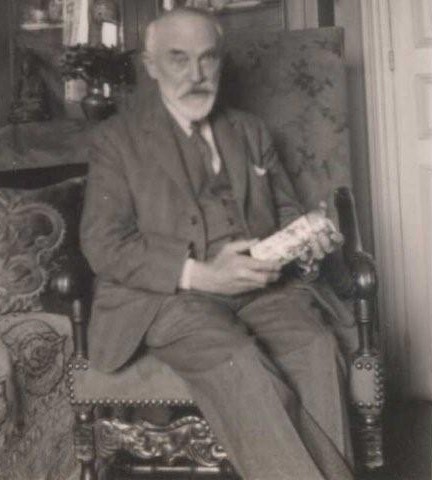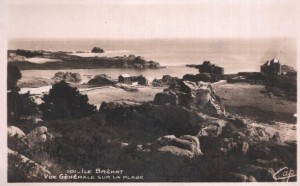Elizabeth Blair Hales lived in Paris , with her husband Samuel from 1906 to 1947. They were artists . This is her account of fleeing Paris, in June, when the Nazis invaded France, transcribed from her diary. She was then 63 and her husband 72.
On June 11th, a Tuesday morning I awoke early with a feeling of oppression. Opening my window, I saw before me a terrible fog, greenish in colour. The sun was hid. The whole aspect uncanny. I hastened along to Sam and said something has gone wrong. With that the bell rang and Madeleine [Sam ‘s secretary] appeared calling out. It is 6 o’clock – the Germans are close to Versailles. I give you 20 minutes to prepare and get out of here. My car is downstairs. We must get to Gare Montparnasse where Val [ her sister], a Red cross nurse, is to meet us. Hurriedly we prepare and took breakfast together.
We stepped into Madeleine’s car and drove down to Montparnasse station, via Boulevard Edgar Quinet. There was already a great assembly of people with luggage of all sorts and kinds. Under the bridge Valentine dressed as a Red cross nurse appeared. We crossed over to the station. There was a long queue of soldiers who looked at us closely. Sam as an old man over 70 was passed. Val had asked me to lean on her arm and look ill – so I passed in too.
Then the soldiers closed around us and we entered the station going into the Red Cross waiting room. It was terrible, all kinds of people on stretchers, some blind, others had fainted, great disorder. Madeleine and Val got our tickets for Le Mans. Our hopes were that we could move on to St Malo and cross to England. In a terrific crowd we moved towards the platform.
Already fighting had begun. All carried heavy hand luggage. We struggled into a second class carriage and by good luck got 2 places. Opposite sat a colonel and his charming wife.
It was people in official positions who had got in. Down below, as the train set off, we looked on to a sea of faces. Quickly we reached Versailles where crowds waited in hopes of getting into the train. Terrible cries of ‘egoistes’ when told there was absolutely no room. But 2 soldiers lifted up 2 young women-mothers of tiny babies and got them in by the window. I held a baby boy of 8 months in my arms.
Then we set off again and from time to time, the same scene was repeated. As the train moved on we watched the great exodus on route. Cars, bicycles too. Exhausted women pushed prams. Old fashioned horse carts dragged on, hanging over with people from all parts of France. Afterwards we heard 10 millions of people left their homes. Many died on the way. People fought and struggled at each little station till Chartres was reached.
Suddenly the train drew up and we sat a long time in darkness. We had fallen on an alerte. The whirr of the German aeroplane was heard to our left and then came a bang and a light. What was touched we do not know but the train drew on in intense darkness until the station was reached. Sam suggested we might as well go on to Rennes. We met a soldier who told us that a train was going to Rennes at midnight.
We climbed into a long train in complete darkness and groped our way along. I said where can we get a seat, when a hand was held out, and someone said ‘follow me’. How kind it was of this woman. In a crowded carriage I was offered a corner. While Sam sat on his bag in the corridor. The young people who offered me a place had come from Le Havre on foot taking many days to get to Brittany, a baby boy of 3 with them. Many terrible stories were told. One that the great reservoir of oil at Rouen had been blown up. This caused the fog in Paris. Moreover all the Rouen bridges were blown up and as droves of people insisted on crossing over them even when warned not to, many were lost and drowned in the river when bridges went under.
At last in daylight at 6 we reached Rennes. Get out and went to a hotel. We had a good breakfast but could not get a room. So we went back in brilliant sun to the place near the station and Sam sat with the baggage and I searched for a room. Refusals everywhere, even at Social Oeuvre and the policeman told me I would never find one. In desperation I tried English church army premises where I spoke with a nice young Irish officer from Belfast. He had slept on the floor all night, and – had nice brown eyes. I went back with Sam and we decided to go on to St Brieuc .
Train at 9 am. Travelled with a lady who was directress of a school at Havre, now on way to Brest to join her daughter, wife of a sea captain. Her school had been blown up. We were glad to be getting away from the sight of so many people, marching with bundles and not knowing where to go.
A man in carriage related horrible tales. He had walked for days from the north and had been with a group of people who had the machine gun turned on them. Enemy aircraft. Saw a man and his son whose heads were blown off. They had to leave them there lying and press on.
When St Brieuc was reached [Wednesday 12th] we got out and went straight to Hotel de l’Ouest and to our great relief got a room.
I went to the post office and talked with an elderly well dressed man from Scotland. Like myself he did not know what was going to happen.
So tired we stayed two nights at good hotel. We listened in at the market place to wireless –news from Paris – very bad. The Germans pressing nearer to Paris . Paul Reynaud the first minister makes a moving speech in which he asks the President of the United States to tell us that he is with us and our friend.
On Friday morning 14th we take little green train running along coast in direction of the Island de Brehat. There we know a Mademoiselle Lepine who has an antique book business opposite to us in Rue Bonaparte. She has a villa on the island where we hope to stay till we cross to England.
We reach Paimpol and drive from there in car to Arcouest – get out with lovely blue sea facing us. We take a little steam boat and cross to island. A kind little woman on the boat offers to take us to Mlle Lepine’s villa which is a long way off. The island is beautiful, probably like the islands in North West of Scotland.
Cottages with thatched roofs, almost no roadways. Paths running through heather and brackens. There are several good villas. Sam is desperately tired so the little woman carries his baggage. Finally she leaves us in the garden and then we sit on grass a long afternoon, waiting on Mme L.
Towards evening she appears, a good looking woman of 40. She had heard at the post office of our arrival and hoped it was her mother and uncle. Very anxious about them, farmers in East of France, near war line.
There is plenty of room in the villa and there we stay for 6 long weeks as paying guests.
Then the Germans quickly occupy all coast line and we are cut off from England. The break between England and France follows and an unpleasant time comes. The people on the island read the newspapers which are controlled by the Germans. And they the French are ignorant enough to believe all they read in heavy propaganda against Britain.
On June 17th when resting in bed we hear a terrific bang. The villa rocks. I jump out of bed. The Germans have bombed Rennes station. 4000 victims. This destroys railway line, now impossible to return to Paris for some time.
I long to get back to the city. The Germans come to the island and ask for names of any British subjects. We are 4. Sam and self. And a young Englishman married to a Frenchwoman. Sometimes she and I talk in the cemetery and agree we are in a fine fix.
The one friend we have is the Mayor-adjoint who likes the British.
Time passes and the day comes when we hear trains are beginning to run again. I take a fixed idea- that we must get away from the island as quickly as possible, lest we get caught and shut up all winter. So I approach the Mayor-adjoint at small town hall and ask him to give us a paper allowing us to go. This he kindly does and advises us not to speak all the way to Paris [a 14 hours journey] and to present the paper if Germans ask for our papers.
So on morning of 27th July we get away and not too soon for the Gestapo calls the very next day [the 28th] and put the young Englishman in camp.
I tip the station master heavily to get us seats on the Paris train – this at Guincamp,
The trains are crowded with Germans. Sam a nervous wreck as he watches them. When the Paris express train runs in, the station master rushes in to it with our baggage and gets us 2 seats. A blessed relief. Soon whole train packed including corridors, people all wanting to get back. We are in the paying train so what can the other one – non paying-filled with refugees be like.
Paris reached at last and Montparnasse station filled with Germans. Outside we find a long line of people asking if they can carry our bags, miserably poor, must be refugees from the north. It does not seem Paris at all, no buses, no taxis, everywhere German notices forbidding us to do anything. Must not go out at night after 11, must not talk in groups. If anything goes wrong you risk 15 years in prison, maybe even shot, a queer Paris.
On Friday morning 14th we take little green train running along coast in direction of the Island de Brehat. There we know a Mademoiselle Lepine who has an antique book business opposite to us in Rue Bonaparte. She has a villa on the island where we hope to stay till we cross to England.
We reach Paimpol and drive from there in car to Arcouest – get out with lovely blue sea facing us. We take a little steam boat and cross to island. A kind little woman on the boat offers to take us to Mlle Lepine’s villa which is a long way off. The island is beautiful, probably like the islands in North West of Scotland.
Cottages with thatched roofs, almost no roadways. Paths running through heather and brackens. There are several good villas. Sam is desperately tired so the little woman carries his baggage. Finally she leaves us in the garden and then we sit on grass a long afternoon, waiting on Mme L.
Towards evening she appears, a good looking woman of 40. She had heard at the post office of our arrival and hoped it was her mother and uncle. Very anxious about them, farmers in East of France, near war line.
There is plenty of room in the villa and there we stay for 6 long weeks as paying guests.
Then the Germans quickly occupy all coast line and we are cut off from England. The break between England and France follows and an unpleasant time comes. The people on the island read the newspapers which are controlled by the Germans. And they the French are ignorant enough to believe all they read in heavy propaganda against Britain.
On June 17th when resting in bed we hear a terrific bang. The villa rocks. I jump out of bed. The Germans have bombed Rennes station. 4000 victims. This destroys railway line, now impossible to return to Paris for some time.
I long to get back to the city. The Germans come to the island and ask for names of any British subjects. We are 4. Sam and self. And a young Englishman married to a Frenchwoman. Sometimes she and I talk in the cemetery and agree we are in a fine fix.
The one friend we have is the Mayor-adjoint who likes the British.
 Time passes and the day comes when we hear trains are beginning to run again. I take a fixed idea- that we must get away from the island as quickly as possible, lest we get caught and shut up all winter. So I approach the Mayor-adjoint at small town hall and ask him to give us a paper allowing us to go. This he kindly does and advises us not to speak all the way to Paris [a 14 hours journey] and to present the paper if Germans ask for our papers.
Time passes and the day comes when we hear trains are beginning to run again. I take a fixed idea- that we must get away from the island as quickly as possible, lest we get caught and shut up all winter. So I approach the Mayor-adjoint at small town hall and ask him to give us a paper allowing us to go. This he kindly does and advises us not to speak all the way to Paris [a 14 hours journey] and to present the paper if Germans ask for our papers.
So on morning of 27th July we get away and not too soon for the Gestapo calls the very next day [the 28th] and put the young Englishman in camp.
I tip the station master heavily to get us seats on the Paris train – this at Guincamp,
The trains are crowded with Germans. Sam a nervous wreck as he watches them. When the Paris express train runs in, the station master rushes in to it with our baggage and gets us 2 seats. A blessed relief. Soon whole train packed including corridors, people all wanting to get back. We are in the paying train so what can the other one – non paying-filled with refugees be like.
Paris reached at last and Montparnasse station filled with Germans. Outside we find a long line of people asking if they can carry our bags, miserably poor, must be refugees from the north. It does not seem Paris at all, no buses, no taxis, everywhere German notices forbidding us to do anything. Must not go out at night after 11, must not talk in groups. If anything goes wrong you risk 15 years in prison, maybe even shot, a queer Paris.
Comment on the story here.


